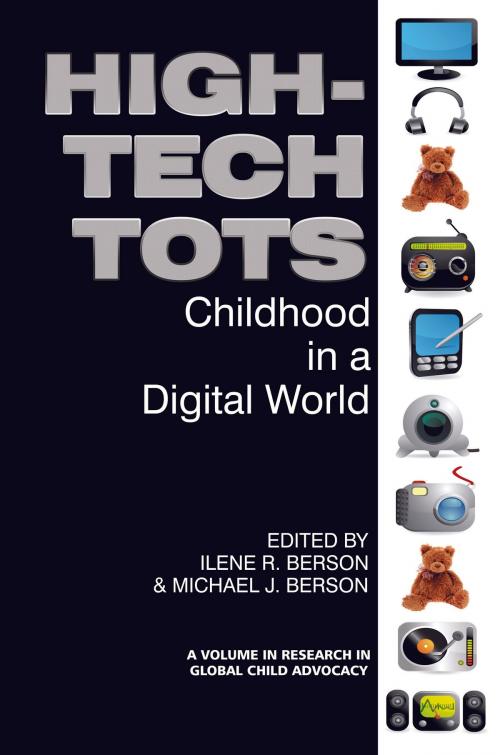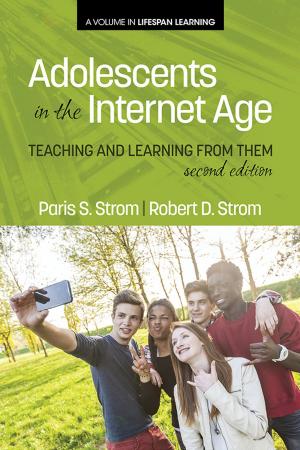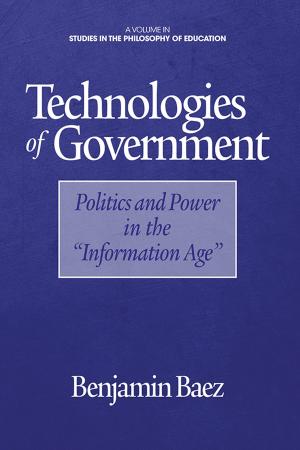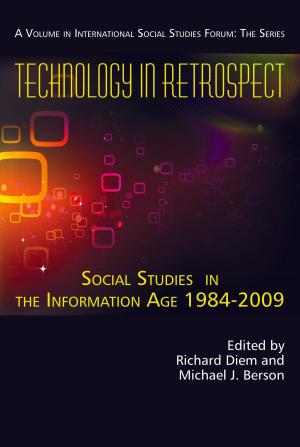HighTech Tots
Childhood in a Digital World
Nonfiction, Reference & Language, Education & Teaching, Higher Education| Author: | ISBN: | 9781617350115 | |
| Publisher: | Information Age Publishing | Publication: | May 1, 2010 |
| Imprint: | Information Age Publishing | Language: | English |
| Author: | |
| ISBN: | 9781617350115 |
| Publisher: | Information Age Publishing |
| Publication: | May 1, 2010 |
| Imprint: | Information Age Publishing |
| Language: | English |
Young children are coming of age surrounded by information and communication technology (ICT). ICT is a prominent force in their lives, and working with ICT can stimulate students intellectually, incite their creativity, and challenge them to apply developmentally appropriate inquiry approaches that enhance their learning experiences. Digital technologies also allow children to expand their physical space and access many online social environments that transcend time and space. However, any focus on the efficiency and effectiveness of technology applications in the early childhood years cannot overlook the potential consequences of technological development on children with regard to their social functioning, interpersonal interactions, and global understanding. In addition to evaluating technology as a tool of instruction, we must focus on educational implications and ethical issues associated with their use. This book is the fifth in the Research in Global Child Advocacy Series. The volume examines theoretical assumptions as well as the application of innovative strategies that optimize the interface between young children and ICT from a global perspective. Despite divergent perspectives, the chapter authors share a commitment to explore the immersion of ICT into the lives of young children and consider the educational value of these tools as well as the developmental appropriateness of technological affordances. This volume brings together scholars and policymakers whose rich discourse delves into questions such as: How do communication technologies benefit young children’s social and cognitive development? What standards and technical specifications are needed to effectively safeguard young children engaged with ICT? How are young children introduced to ICT? What are the challenges and risks for young children online? What programs are effective in mediating risk? What are the educational applications for ICT in early childhood? Is social networking the new "online playground” for young children? How can young children become competent users of digital technology and media? How can early childhood educators and families encourage positive usage and discourage negative social consequences associated with today’s technology? How can ICT enhance teaching and learning for young children? What ICT activities are developmentally appropriate for young children? In the book there are three primary areas of emphasis: (a) ICT as a teaching and learning tool across cultures and countries to promote the social and cognitive development of young children; (b) research on developmentally appropriate education on cybersafety and cybercitizenship; and (c) studies on the influence of digital technologies on young children, including exposure to inappropriate content and participation in online social networks. This resource offers readers a glimpse into the experience of children and the expertise of researchers and professionals who diligently work toward crafting a framework for action that reflects intercultural and crossnational initiatives. Given the role that electronic media plays in the lives of children as both an educational and entertainment tool, understanding the physical and social contexts, as well as the developmental issues, is critical to programs aiming to optimize the full potential of digital tools that support and enhance the experiences of young children.
Young children are coming of age surrounded by information and communication technology (ICT). ICT is a prominent force in their lives, and working with ICT can stimulate students intellectually, incite their creativity, and challenge them to apply developmentally appropriate inquiry approaches that enhance their learning experiences. Digital technologies also allow children to expand their physical space and access many online social environments that transcend time and space. However, any focus on the efficiency and effectiveness of technology applications in the early childhood years cannot overlook the potential consequences of technological development on children with regard to their social functioning, interpersonal interactions, and global understanding. In addition to evaluating technology as a tool of instruction, we must focus on educational implications and ethical issues associated with their use. This book is the fifth in the Research in Global Child Advocacy Series. The volume examines theoretical assumptions as well as the application of innovative strategies that optimize the interface between young children and ICT from a global perspective. Despite divergent perspectives, the chapter authors share a commitment to explore the immersion of ICT into the lives of young children and consider the educational value of these tools as well as the developmental appropriateness of technological affordances. This volume brings together scholars and policymakers whose rich discourse delves into questions such as: How do communication technologies benefit young children’s social and cognitive development? What standards and technical specifications are needed to effectively safeguard young children engaged with ICT? How are young children introduced to ICT? What are the challenges and risks for young children online? What programs are effective in mediating risk? What are the educational applications for ICT in early childhood? Is social networking the new "online playground” for young children? How can young children become competent users of digital technology and media? How can early childhood educators and families encourage positive usage and discourage negative social consequences associated with today’s technology? How can ICT enhance teaching and learning for young children? What ICT activities are developmentally appropriate for young children? In the book there are three primary areas of emphasis: (a) ICT as a teaching and learning tool across cultures and countries to promote the social and cognitive development of young children; (b) research on developmentally appropriate education on cybersafety and cybercitizenship; and (c) studies on the influence of digital technologies on young children, including exposure to inappropriate content and participation in online social networks. This resource offers readers a glimpse into the experience of children and the expertise of researchers and professionals who diligently work toward crafting a framework for action that reflects intercultural and crossnational initiatives. Given the role that electronic media plays in the lives of children as both an educational and entertainment tool, understanding the physical and social contexts, as well as the developmental issues, is critical to programs aiming to optimize the full potential of digital tools that support and enhance the experiences of young children.















